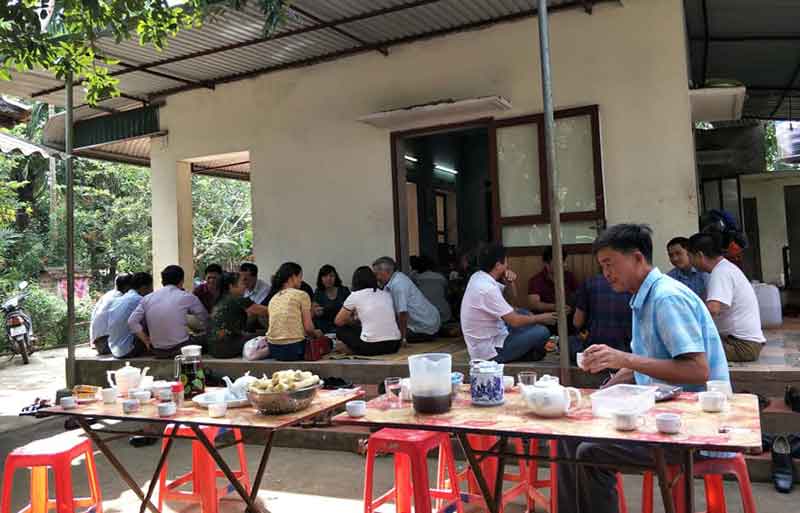(HBO) — Every year, on the 26th day of lunar October, people in Muong Ram village, Lac Thinh commune, Yen Thuy district, organise a traditional ‘De” rice (fermented rice) festival.
Bui Thi Nhin, Dinh Van hamlet, Lac Thinh commune (Yen Thuy), prepares food including ‘de’ rice for worshipping ancestors.
This is a unique festival of the people in Muong Ram. On the tray of offerings, there must be ‘de’ rice made of fragrant glutinous rice mixed and brewed with yeast made from wild leaves. The rice is the most important offering together with other mountainous foods including bamboo shoots, boiled luffa, steamed sticky rice, and roasted sesame.
"Nowadays, with better living conditions, after offering vegetarian food to ancestors, families also prepare meat-based offerings such as grilled fish, grilled pork/beef, and boiled chicken," said Bui Thi Nhin, an elderly in Dinh Van hamlet, Lac Thinh commune. The traditional ‘de’ rice festival is different from the new rice festival, she said.
‘De” rice festival is usually prepared from the afternoon of the 25th or in the early morning of the 26th day of lunar October when there is no sunlight. Muong Ram people believe that early morning is the most sacred and cool time. The tray on which offerings to ancestors are arranged is placed in the middle of their silt house. The host invites a reputable shaman in the village to worship or do worshipping rituals by himself, praying for favourable weather, bumper crops, and health.
After the ceremony of offering ‘de’ rice and new rice, all family members gather around the tray and have meals. On the morning of the 26th day of lunar October, relatives and friends come to extend greetings to the host. Everyone enjoys a little ‘de’ rice, wishing for good luck and health, which has become an indispensable cultural feature of the Muong Ram people.
Today, as living conditions have improved a lot, people in Muong Ram village still preserve traditional festivals. There are legends about the origin of the ‘de' rice festival in Muong Ram. One goes that once upon a time, there was a general who led troops to fight an enemy from the north. He lost a battle in which he got wounded. He and his troops by chance ran to Yen Thuy and asked for a stay in a house of a Muong family. It was early morning and the poor family had nothing to treat unexpected guests.
They boiled papaya and bamboo shoots for them. Then they also gave him some "De” rice which the host prepared to make wine for the new year festival. The rice in a process of fermentation with both spicy and sweet tastes became a delicious food for the very hungry soldiers.
Talking to locals in the morning, the general recognised that they usually suffered from hunger due to drought. The general was touched by the host family’s goodness, he helped the people pray for rain. After that, the rain did come and local people were so happy and grateful for the rain. Since then, they held the ‘de' rice festival every 26th day of lunar October. On that day, they prepare dishes that are the same as how the poor family treated the general and his soldiers.
Another legend goes that two men named Cun Ram and Dao Trac discovered and built the villages of Muong Ram and Muong Trac. Seeing the miserable life of people, before his death, Cun Ram told his children and grandchildren that after harvest time, villagers should prepare a vegetarian meal to worship the village’s God and their ancestors, praying for health, peace, and prosperous business.
Bui Huu Co, of Dinh Van hamlet, Lac Thinh commune, said that following a time-honoured tradition, his family celebrates the ‘de’ rice festival and the new rice festival every year. His children and grandchildren also have an opportunity to reunite, solidify bonds, and remember ancestors as well as those who contributed to the village. On ‘de’ rice festival, friends or visitors to families are considered valuable guests. Guests and hosts take ‘de’ rice and drinks together, wishing each other good health, good luck, and peace.
Tran Trung Kien, head of the Culture and Information Office of the district, said that the ‘de’ rice festival is a cultural tradition that is well preserved. Ram communal house and ‘de’ rice festival were recognised as a cultural historical relic ò the provincial level in Decision No. 2913/QD-UBND, dated November 16, 2016, of the Provincial People's Committee.
The culture department has advised the district Party Committee and the district People's Committee to organise a workshop to seek solutions for further preservation and development of the cultural values./.



